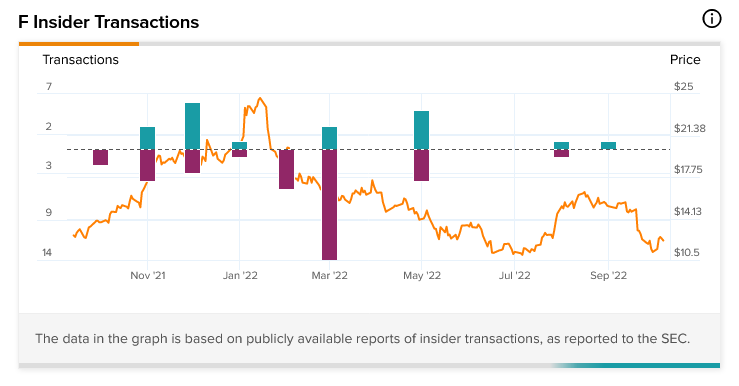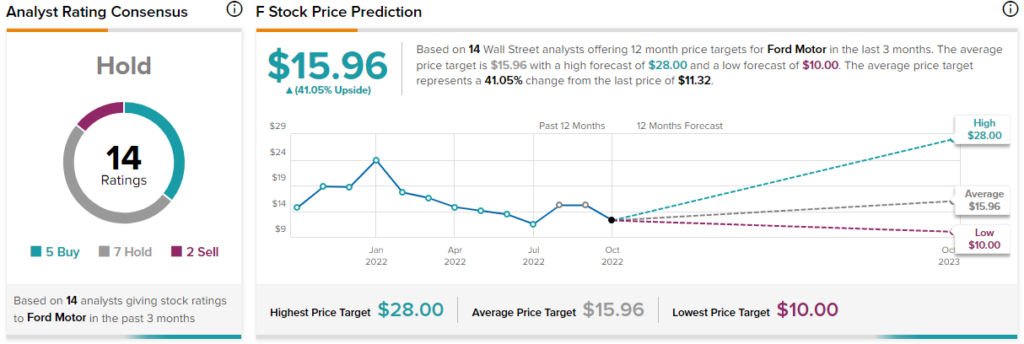The week didn’t kick off well for Ford (NYSE:F) at all. The automotive giant slid over 6% in pre-market trading on Monday, and it also kept those losses going into the day’s trading session. What took the wind out of Ford’s sails was a downgrade from Goldman Sachs (NYSE:GS). Analyst Patrick Hummel lowered Ford from Neutral down to Sell. Hummel also cut the company’s price target from $13 per share to $10 per share. Hummel noted that a recession in the U.S. and troubles in Europe are likely to add up to a disaster for the company.
The news wasn’t good for Ford and worse for Ford investors. Two months ago, I was neutral on Ford, thanks to a worsening economic climate and a rising price structure. I’m staying neutral, mainly because the picture hasn’t changed enough from last August to really justify any move in assessment.
The last 12 months for Ford shares started off well but couldn’t hold on to the gains realized. Last October, the company began an upward trek that saw shares briefly break the $25 level. After January’s midpoint passed, though, the company began a long trip down that finally saw a bottom in July. Now, shares are trading at around $11.
Investor Sentiment is All in or Nothing at All
The state of investor sentiment at Ford is at least a little strange right now. Some metrics have been mostly quiet for months. Others are screaming. Currently, Ford has a ‘Perfect 10’ Smart Score on Tipranks. That’s the highest level possible, meaning that it’s almost certain that Ford will ultimately do better than the broader market, according to this metric.
However, despite this, Ford insiders seem in no rush to buy the stock. In fact, insider trading at Ford has been relatively quiet since last April. There hasn’t been an informative transaction made in the last three months. The last one was an Informative Sell from Ford Blue President Galhotra Ashwani Kumar, who sold $321,320 worth of shares.

The aggregate, however, tells a different story. In the last three months, insiders have purchased Ford stock twice and sold it once. However, in the last 12 months, the story has been much different.
First, there were no transactions for May or June 2022. Second, the aggregate shows a clear rush for the exits. Insiders sold Ford stock on 34 occasions. Meanwhile, they bought stock on 20 occasions.
A Long Slog Ahead for Ford
There are two words that describe what Ford is likely to run into right now: bullwhip effect.
For those unfamiliar with the term, the “bullwhip effect” is a term that describes how issues in a supply chain can amplify the farther from the supplier one considers. Normally, a bullwhip effect starts at the retail level, as retailers modify their orders to wholesalers, and wholesalers, in turn, modify their orders to the manufacturer.
Here, however, wholesalers tend to increase their demand for manufacturers, as they have less information to work with. Thus, the wholesalers extrapolate future demand trends based on the increased orders they get from retailers.
They, in turn, increase their orders to the manufacturer significantly, anticipating that more retailers will behave like the ones who placed the larger orders.
It’s a bit different this time around, though; retailer demand is explosive because they’ve been getting half-orders and quarter-orders and “sorry, sold out” for months now, thanks to issues in the supply chain.
Manufacturers have been frantically trying to fill demand holes for months now, but they’re doing so right at a time when demand for everything is about to plunge: a recession.
Thus, it’s a safe bet that soon, Ford will have a lot of cars on its hands that it can’t sell. That’s mainly because the demand that prompted the increased production has suddenly vanished.
The vagaries of supply and demand aren’t the only problem ahead for Ford, though. Ford is also facing issues with its electric vehicles. Certainly, they’re in demand, and in a big way. It’s now impossible to order an entry-level Ford Mustang Mach-E, reports note, as demand is outstripping supply.
Yet, there are clear signs the market isn’t happy with Ford’s electric trucks. One significant disaster for Ford emerged when Tyler Hoover—operator of the Hoovie’s Garage YouTube channel, which boasts a subscriber base of 1.4 million—revealed that the Ford Lightning EV “can’t do normal truck things.”
This is the last thing any marketing department wants to hear from a YouTube influencer with 1.4 million subscribers. Hoover detailed how towing with the Ford Lightning was a “total disaster.” The truck was unable to tow a 3,500-pound 1930s Ford pickup for more than 100 miles without running out of charge.
That’s not the only problem, either; James Klafehn, another YouTube personality with a substantial subscriber base, detailed issues of getting the trunk to close properly.
Klafehn also noted troubles with the optional massaging seats, which haven’t worked since the truck was delivered. Worse, reports note that some messaging forums report similar issues with the trunk.
Recent reports also suggest that owning a Ford Escape could result in outsized repair costs. That’s bad news considering that General Motors (NYSE:GM) offers a very similar model, the Chevrolet Equinox.
Is Ford a Good Stock to Buy?
Turning to Wall Street, Ford has a Hold consensus rating. That’s based on five Buys, seven Holds, and two Sells assigned in the past three months. The average Ford price target of $15.96 implies 41.1% upside potential.
Analyst price targets range from a low of $10 per share to a high of $28 per share.

Conclusion: Hold on to Ford, and Hold on Tight
Ford is facing a lot of bad news right now. There are competitors on all sides and some significant issues with its product line that could readily be used against it by astute marketing departments. Also, the macroeconomic environment definitely doesn’t support high demand for anything beyond the most basic of food and shelter needs.
Yet, we must consider the whole picture. Ford is trading only slightly above its lowest price targets, making for a worthwhile entry point. There is substantial upside potential to investing in Ford as well. The problem is that the upside isn’t likely achievable under current conditions.
That isn’t to say that that upside won’t occur later on. Looking for big gains at Ford in the near term is probably a forlorn hope. However, looking for Ford to perform after the supply-chain issues are finally worked out and demand comes back? That’s entirely possible.
There’s a path to victory for Ford, but it depends on a lot going right, including quite a few things that are out of Ford’s control. Thus, I’m neutral on Ford; getting in now may be a good idea for the long term, but that may be too far off for many investors.









